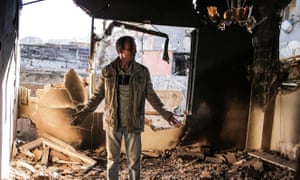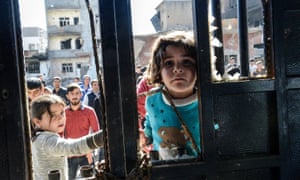Erdogan's War
"Those who did this are not human. What took place here is a second Kobani in a country that is supposed to be a democracy."
Serif, Ozem, Cizre resident, Turkey
"They destroyed houses by placing explosives from the kitchens to the bedrooms. They attacked callously and mercilessly without distinguishing between military, police, women, men, old or young."
Governor Ali Ihsan Su, Sirnak province
 |
| Militants from the Kurdistan Workers' Party, or PKK, run as they attack Turkish security forces in Nusaydin, Turkey, Tuesday, March 1, 2016 |
"They say the operations have ended but we just don't know. If peace isn't achieved ... it's not over."Nurettin Guler, 55, Cizre
The Turkish military was tasked by its government of Recep Tayyip Erdogan to inflict upon his Kurdish citizens what the Islamic State of Iraq and the Levant treated the Kurdish residents of Kobani in Syria, on the border with Turkey, to, in a paroxysm of violent destruction and death. The Syrian regime which has earned such contempt and rage from the Turkish government over its unrestrained bloodshed heaped upon Syria's Sunni civilians can look to Turkey with equal disgust at its treatment of Turkish Kurdish citizens.
The PKK fights a guerrilla war with the Turks. The militias fight a no-holds-barred struggle with Turkey in a determined bid to win a piece of territory that Turkey refuses to surrender to them in their demand to have a homeland of their own for the tens of millions of Kurds living under oppressive Turkish rule. A fragile halt to violent hostilities was upended when President Erdogan viewed the Kurdish political wing as having become too powerful in parliament, winning sufficient seats to constrain the Justice and Development Party's leader from changing the country's constitution.
Mr. Erdogan has never had any thought of his Kurdish citizens as being anything but traitors to the country, accusing Kurdish politicians of doing the work of the Kurdish Workers Party, the militant wing whose fixation on separation is unstoppable, so he used the pretext of several Turkish police hit by the PKK to launch an all-out battle in Turkey's mostly-Kurdish southeast. Turkish warplanes and tanks enhanced the security forces' assaults against Kurdish towns.
The PKK had built barricades, dug trenches and planted explosives to stop the advance of the military intending to prevent them from invading land the PKK aspires for self-rule. The town of Cizre, one among many hit by the military, is among the worst afflicted. But the government has declared its purpose completed, the ouster of the PKK militants a success, allowing residents to return to their homes. And as they returned they viewed a scene of utter destruction.
Where the extensive military operations left a town of 132,000 reeling in disbelief at the cataclysmic wreck they have been left with, resembling what neighbourhoods in Syrian cities and towns look like; buildings gutted by shelling or collapsed, their neighbourhoods razed, and homes damaged beyond repair. Over 600 Kurdish rebels, the army claims, were killed in Cizre. And according to human rights groups 92 civilians killed in the town, with another 171 bodies since discovered.
 |
| A man looks in shock at his destroyed house in Cizre. Photograph: Cagdas Erdogan/Getty Images |
But residents loaded vehicles with belongings and their children and returned, to find bombed-out buildings in battle-scarred streets amid the stench of death, and several rotting corpses. Security forces demolished whatever they could. Curfews were imposed and remain in the city of Diyarbakir, the main Kurdish town, along with Idil in Sirnak province where operations against the PKK continue.
"There is no way we can live here", said Ayse Magi, mother of five, as she surveyed her house, weeping at the broken condition of her modest home. The provincial governor warned returnees to maintain a careful eye for undetected explosive devices in their homes for which he blames the militants. According to the governor, 708 barricades were dismantled, 264 trenches filled, and 1,409 improvised explosive devices disposed of, while automatic weapons and other firearms and hand grenades were found.
 |
| A girl looks at a dead body among the rubble of damaged buildings in Cizre. Photograph: Ilyas Akengin/AFP/Getty |
Over 300 security force members died since July in their conflict with Kurdish rebels who did their best to give as good as they got.

<< Home